Behind the Bidding: Inside the world of 'forfeiture' public auctions
An auction experience in Chicago in 2021 led one woman we met on on a three-year journey to warn others.
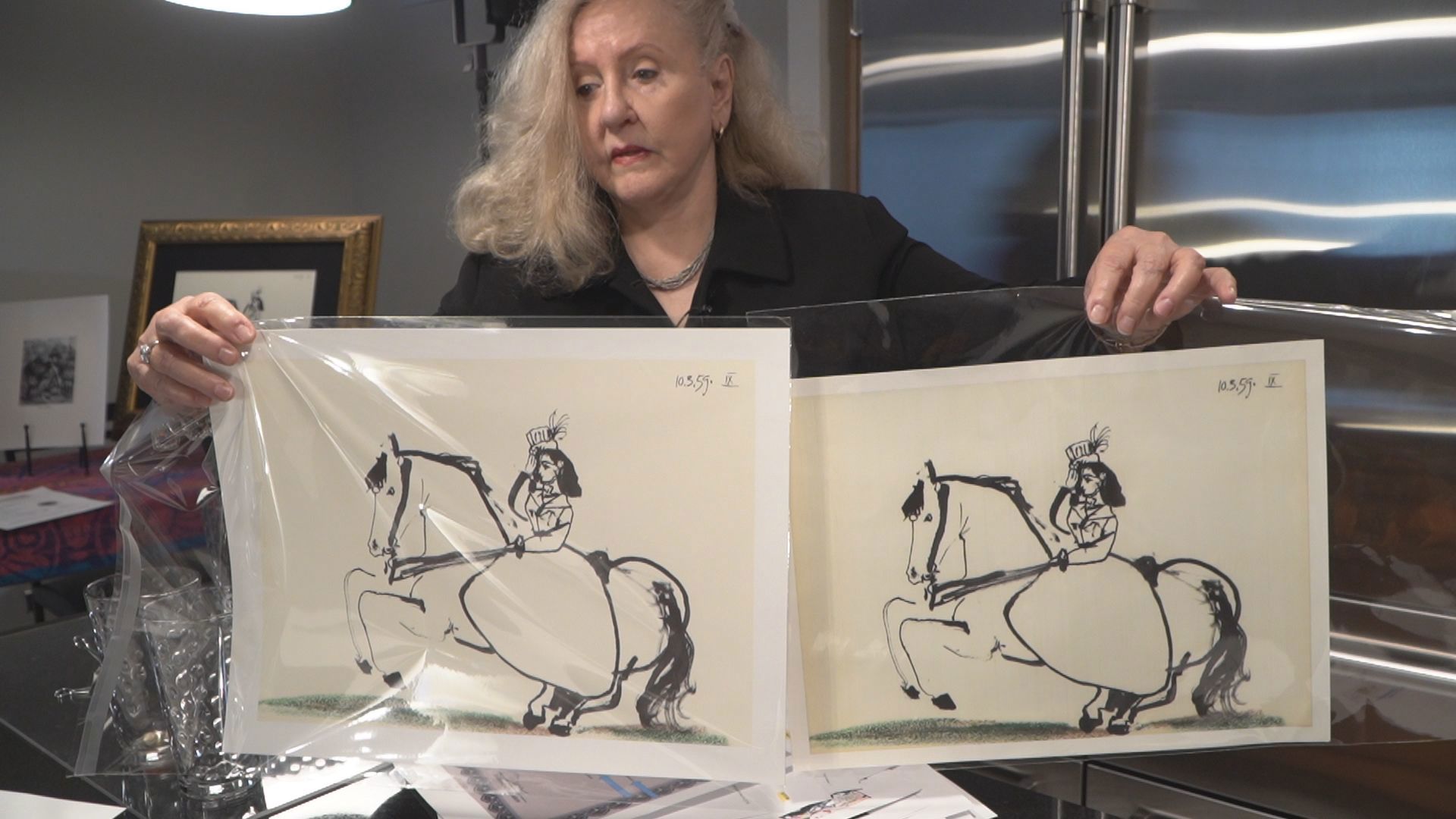
You've probably seen these roadside signs pop up in your neighborhood advertising government-asset forfeiture public auctions. They promise access to high-end jewelry, original masterpieces, even fancy sports cars.
But is someone else's misfortunate your opportunity to get a great deal?
In a four-part series, streaming now on WUSA9+, we take you inside those neighborhood auctions and take a closer look at an auctioneer at the center of numerous consumer complaints.
Chapter 1 Rebecca's crusade
On a short drive around town, WUSA9 spotted dozens of these signs, boasting a collection of high value goods ranging from Peter Max artwork and Cartier watches to a brand new McLaren GT and Lamborghini.
It can be enticing.
And for some, it was. Yet, these neighborhood auctions are also at the center of intense scrutiny as some attendees allege the items they purchased were not as valuable as they were told.
“I’m one of the rare people that actually got her money back,” said Rebecca, a Chicago-based woman who wished to only use her first name to protect her identity. “My goal is to warn as many people as I can.”

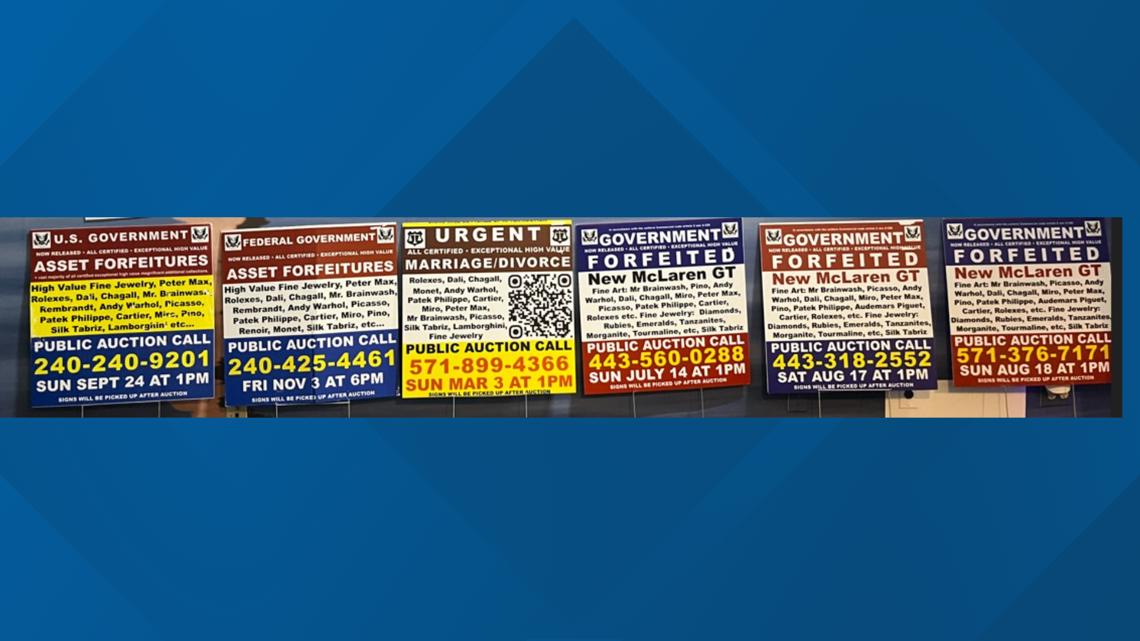
Rebecca said she has had an ordeal with what she thought would be a fun time at a neighborhood auction she attended in Chicago of 2021.
“I kept seeing all of these signs,” she remembered. “Sign after sign…and all of these signs said auction and I thought, I’ve got nothing to do.”
So, she went to the auction. What she didn't know then, was it would mark her start of a three-year journey to warn other auction attendees.
Rebecca told WUSA 9 the auction she attended was organized by Surplus Auctions. The auction advertised high value jewelry, original art and even an orange Lamborghini. In court documents, Rebecca said the items were advertised as having "exceptional high value" and that the items were all certified. With that assurance, Rebecca felt comfortable bidding on a few items that caught her attention.
“I purchased a diamond bracelet, and I purchased two art pieces, she said. "One was supposedly a Picasso, and one was supposedly a Renoir."
For all her finds, Rebecca paid a total price of $15,180, including tax. The framed Picasso was $6,900, the Renoir was $2,300 and the diamond bracelet was $3,000, for which Surplus Auctions provided her with a $21,000 GemAssure jewelry appraisal report.
But when Rebecca got the items independently appraised, she was shocked by the value difference.
“I was surprised to find out that my bracelet that was supposed to be valued at $21,740 was only worth $3,000,” Rebecca said still in disbelief. “The Picasso and the Renoir had combined value of less than $100.”
What Rebecca thought was a bargain for seemingly high-end pieces of art and jewelry quickly turned into great frustration. She immediately called her credit card company and reported her concerns about the authenticity of the items she purchased, and was able to get most of her money refunded.
“I’m one of the rare people that actually got her money back,” she said receiving $12,000 of the $15,000 she spent at Surplus Auctions. “I prepared an extensive document proving that what [Surplus Auctions] had sold me was not what they had said that it was worth.”
Surplus Auctions did not respond to WUSA9 after multiple requests for comment.
Although Rebecca returned the Renoir and Picasso paintings, she kept the diamond bracelet valued at $3,000.
“I turned my anger to curiosity, and I needed to find out who are these people?” Rebecca said. “Why are they doing this to me?”
She said she didn’t hear from the auction company about getting her money until she began posting comments about Surplus Auction on the social media forum Reddit.
“I was causing them a lot of pain and agony because of the Reddit post that I was making,” she said. “They were able to figure out who I was, so they brought a lawsuit against me for $1.2 million.”
That legal action filed in Cook County, Illinois alleged Rebecca defamed the company online and that her allegations were not true.
"...statements implying that Plaintiff's business is a 'scam' are entirely false," read the complaint filed by Delaware-based auction company Neoclassic Auctions, LLC. "Plaintiff maintains a legitimate operation of acquiring valuable items and collectibles via forfeiture sales, divorce settlements, estate sales, foreclosures, and other sources, and selling these at auction."
In a response filed by Rebecca's lawyer, they argued the auction company failed to provide specific "defamatory" comments made by Rebecca on Reddit about the company. They contend that she was expressing her opinion, which, according to their motion to dismiss complaint, is protected speech under the First Amendment.
“In my opinion, the entire lawsuit was about fear and intimidation. They just wanted me to shut up," Rebecca said. "But furthermore, beyond that, they wanted me to sign a release or an NDA. They just wanted me to shut up, go away. I refused to sign that NDA [Nondisclosure agreement] and I have no intention of signing it."
In the complaint, the company admitted that the art pieces were not original paintings. In fact, the Renoir and Picasso, purchased by Rebecca, are both ‘limited editions’, legal filings showed.
The case continues to work its way through the Cook County court system. Rebecca and Neoclassic Auctions have been locked in tense negotiations for months with no clear terms or resolution. For now, the case remains open, and the judge could decide to throw the case out or move it forward.
WUSA9 reached out to Neoclassic Auctions and its subsidiaries several times for this story. We sent emails, called, faxed and mailed letters and have yet to receive a response.
Neoclassic Auctions also does business in Virginia, Maryland and other states, and holds auctions under at least 17 other names, including the name Surplus Auctions.
“It’s a huge operation and they wouldn’t be doing it if they weren’t making any money,” said Rebecca.

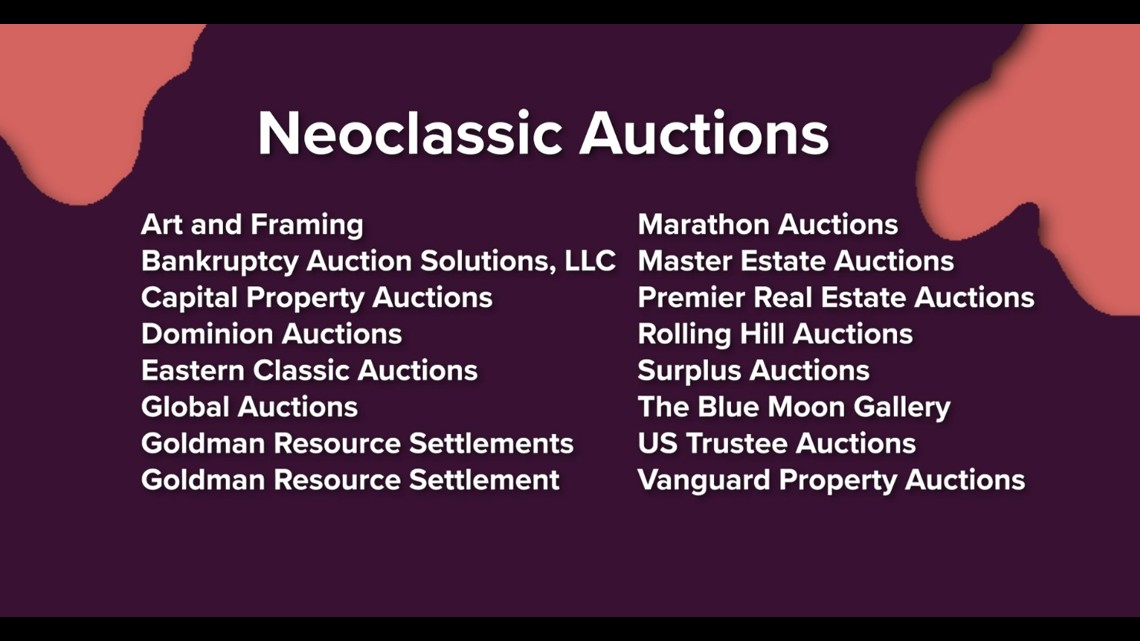
Chapter 2 Chance encounter
Tatiana, who also asked to only use her first name for fear of retaliation, has her own story with "government forfeiture auction" signs. She saw the signs posted around Chicago in 2022. Intrigued, Tatiana and her husband opted to attend one for her birthday.
When Tatiana and her husband arrived at the auction, it was well underway. Once seated, Tatiana said the man next to her bought several paintings for over $10,000 each.
“People were going crazy,” remembered Tatiana. “It also got us a little bit excited.”
She and her husband bought what the auctioneer advertised as a Rolex watch, a Breitling watch, diamond earrings, a sapphire and diamond necklace, and a Rembrandt. Their bill totaled $50,000.
“I consider myself a collector,” she said.
As Tatiana and her husband were leaving the auction, the couple ran into a woman in the lobby. It was Rebecca.
“I told her what we bought,” Tatiana recalled. “She said everything was fake. My husband told me [not to let] this woman…spoil our fun. I [am] so thankful for her. You cannot even believe it.”
In the last three years, Rebecca has been to four other auctions in the city of Chicago, all held by the same auctioneer. She's been on a mission to warn others like Tatiana, she told WUSA9.

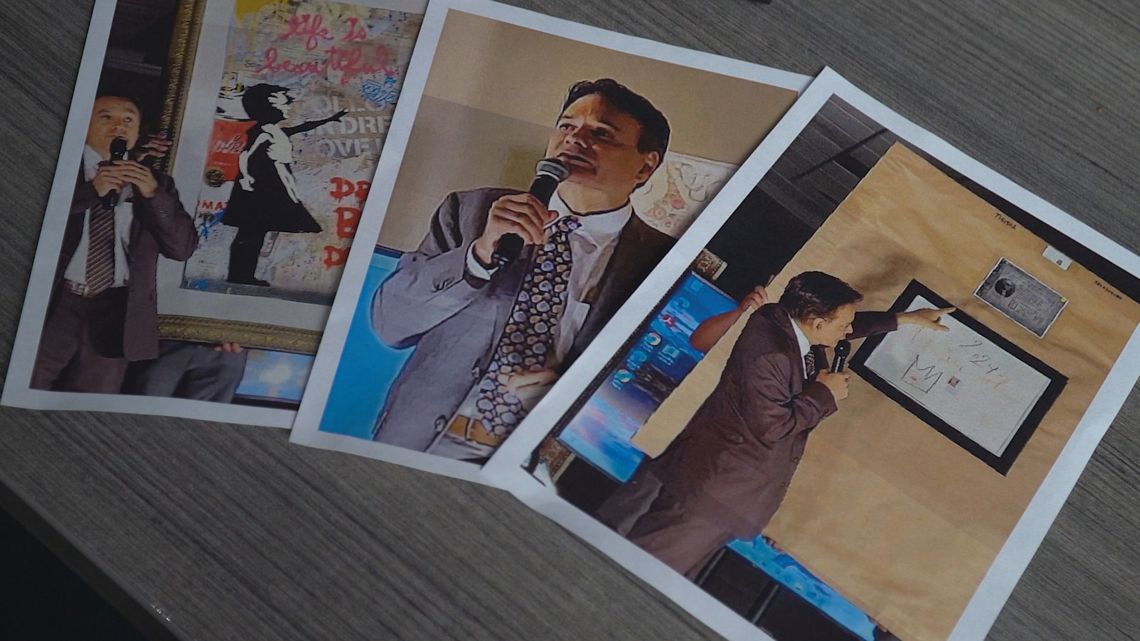
Like Rebecca, Tatiana also paid for an independent appraisal and received disappointing news.
“I was in shock," Tatiana said. "I don't even have words to…explain to you how I felt when they told me that all four pieces that I paid $57,000 for was under $7,000."
Eventually, Tatiana tracked down the auction company. They agreed to accept the return of the Rembrandt and two watches, and gave Tatiana a $38,000 refund. But she said the auction company refused to accept the diamond earrings or the sapphire and diamond necklace she also purchased.

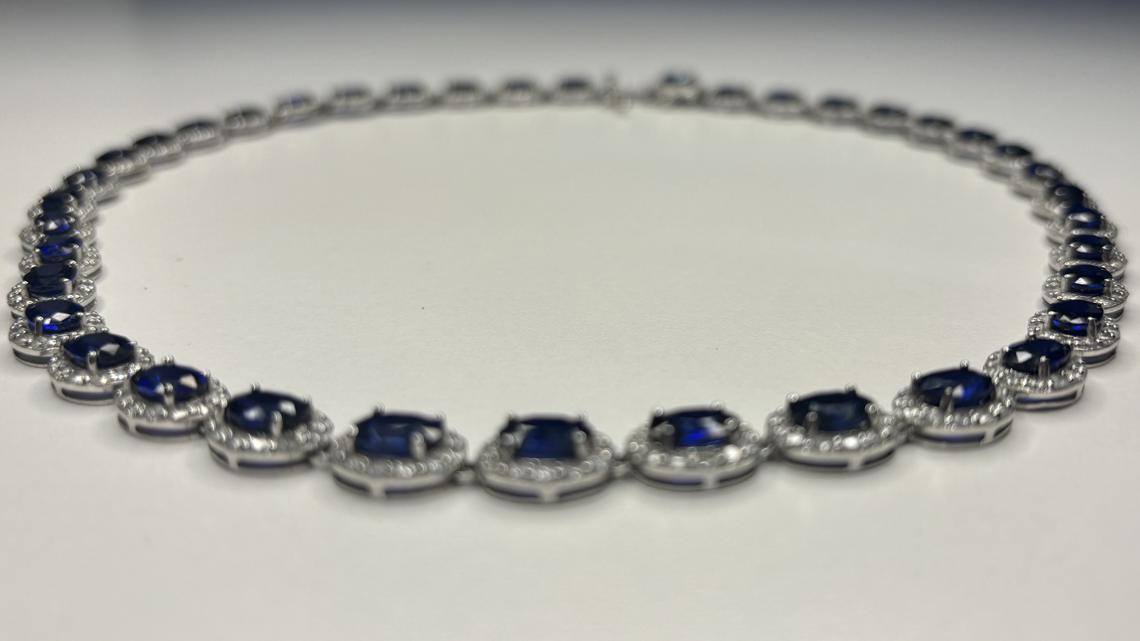
For Tatiana, the deal she agreed to with the auction company was not good enough. She filed a police report with the Lombard Illinois Police Department and while that didn’t help her case, she said officers told her she wasn’t the only one to file a complaint.
“It was a disappointment. Like you're violated, embarrassed, angry and you know what, two years pass by and I'm still angry when I think about this,” she said.
Since March, WUSA9 has been trying to speak with the auctioneer, his business associates and the network of companies that operate these auctions.
It isn't clear who is running the auctions, although photographs from several prior auctions and those attended by WUSA9 show an auctioneer familiar to investigators in both Maryland and Virginia, complaint records showed.
When confronted, the auctioneer and his business associates refused to speak with WUSA9.

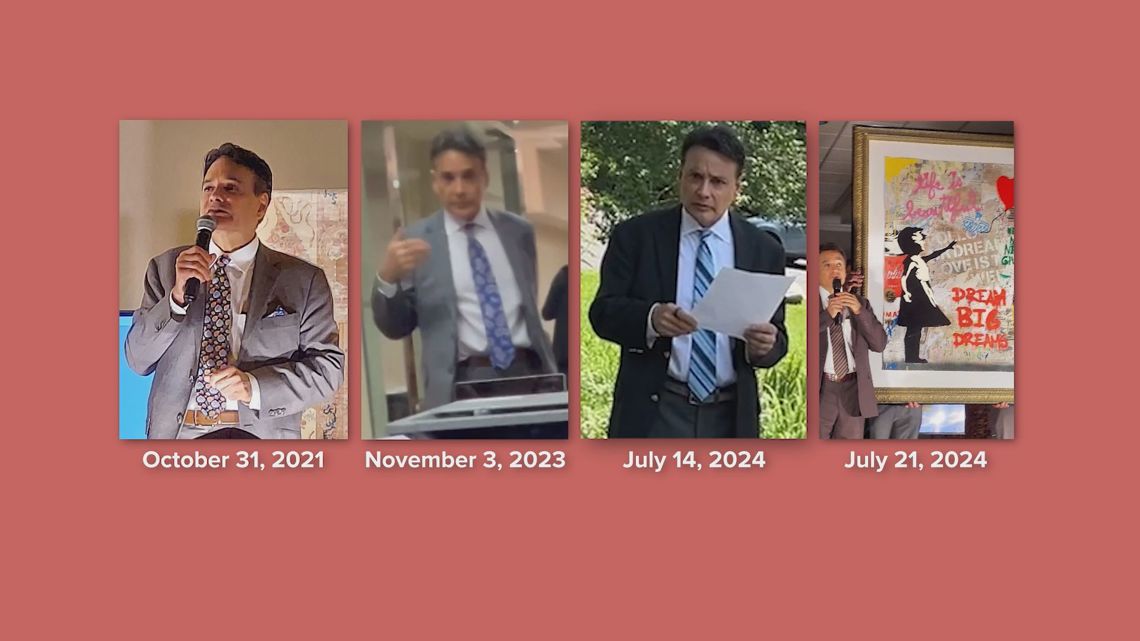
Chapter 3 The auctioneer
For the last year, WUSA9 has watched as these auction signs appeared overnight in neighborhoods across the D.C. region and then quickly disappeared. The fast moving signs left some customers with complaints about their purchased merchandise with nowhere to go for a resolution or a refund.
WUSA9 spotted signs for an auction at the Bolger Center in Potomac, Maryland in the fall of 2023 and attended. The auction was organized by Goldman Resource Settlements, documents shows.
As the process unfolded, several members of WUSA9's investigative team went inside the facility and handed over government issued ID's, which were copied by the staff onsite. In exchange, our team was given a paddle with a number and a paper that provided terms and conditions for the event.
"The auctioneer specifically makes no warranty or representation as to the value of any particular items," the terms and conditions listed.
Additionally, the auctioneer accepts no responsibility for the, "authenticity, age, origin, condition, size, weight, quality or kind."

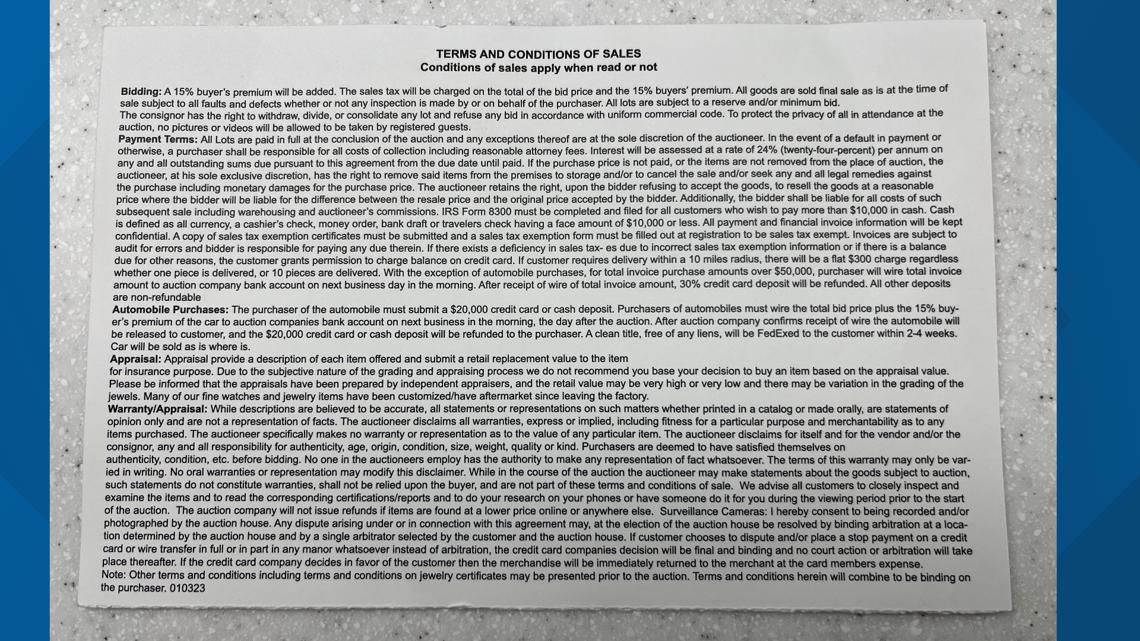
Attendees were not allowed to record video or take photos inside the room where the auction was held due to privacy concerns, organizers told WUSA9.
While inside the auction, organizers verbally told members of the WUSA9 team the items up for auction were all legitimate works of art; some were originals and others were high-end reproductions. WUSA9 spotted one piece labeled as a Picasso and an Andy Warhol.
"Many of our fine watches and jewelry items have been customized/have aftermarket [sic] since leaving the factory," the terms and conditions included.
After attending an event for ourselves, we had even more questions. In the search for answers, WUSA9 focused on Goldman Resource Settlements. We tracked the company to an address and found a virtual workspace on Sangamore Avenue.
WUSA9 tried reaching the auctioneer for months via phone, email and fax. We never heard back from him, nor any of his business associates. Eventually we dropped a letter to Goldman Resource Settlements in a box with an Airtag, and tracked our letter as it went from D.C. to their address on Sangamore Ave. It sat at that address for about a week before it was returned to our building.
Next, our team dug into decades of business records. According to the Virginia State Corporation Commission records, Goldman Resource Settlements is not the real name of the company behind the auction WUSA9 attended in late 2023, but it was a name we were familiar with: Neoclassic Auctions, the same company that took legal action against Rebecca.
Records show the Neoclassic Auctions also operated auctions under at least 15 other names. We tracked down their base of operations to an address near Dulles International Airport, which is tied to two brothers, Anwar and Azam Khan.

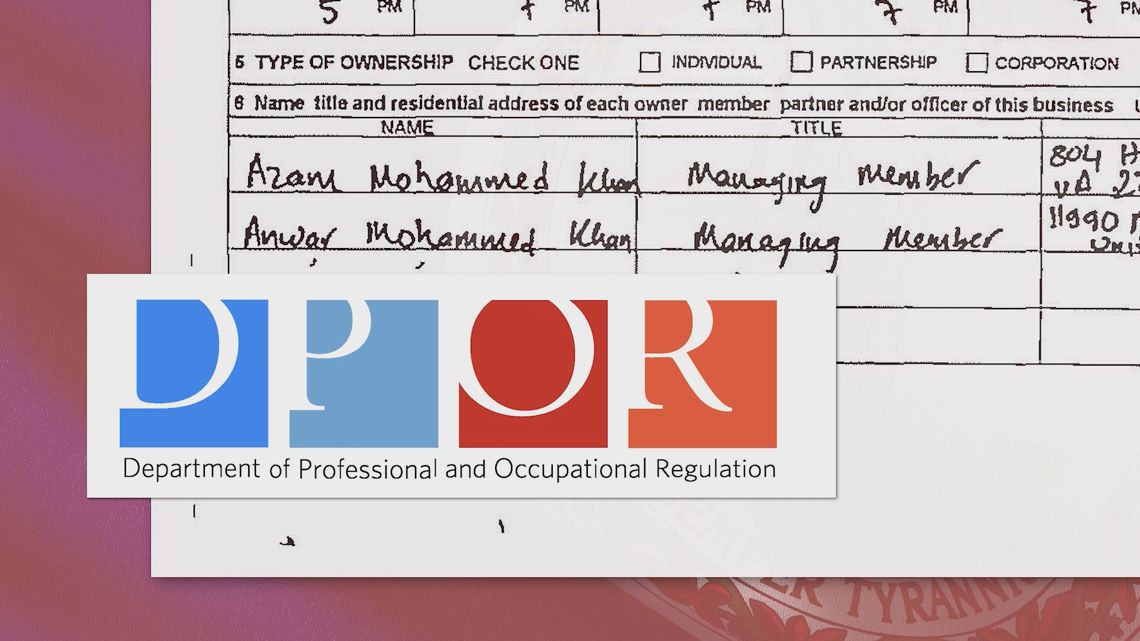
Records reviewed by WUSA9 showed both men have a long history with Virginia state regulators and other enforcement agencies across the country. WUSA9 tracked Azam Khan, Anwar Khan, and their various business entities across 20 states. In half of those, WUSA9 found actions against Azam or Anwar for things like misleading and deceptive advertising, using fake bidders, and unlicensed activity. In Virginia, Anwar Khan surrendered his license after the board of auctioneers discovered misleading ads that made it sound like the auctions were sanctioned by the government and said, "they hired temporary workers form an employment agency to act as shills."
Azam Khan was also investigated in the Commonwealth in four other cases. Those involved misleading advertising, failing to maintain records, and failing to notify the board about his suspension in Wisconsin. Records show Florida suspended both their auctioneer licenses. Oregon investigated Anwar Khan for unlicensed activity and alleged unlawful trade practices. Kentucky revoked Anwar’s auctioneer’s license and investigated Azam for misleading advertising.
“They are fly by night auctioneers, they come into Montgomery County ... and they show up just for one day, and then they just disappear," said Eric Friedman, director of the Montgomery County Maryland Office of Consumer Protection.
Friedman added that the Goldman Resource Settlements auction WUSA9 attended was operating illegally from the get-go.
"You can't put a sign like that without having a permit," he said. "So, it starts out with something that's a matter of deception to begin with."
According to Friedman, Neoclassic Auctions doing business as Goldman Resource Settlements did not have a permit to post roadside signs and it was not licensed to sell secondhand property in the county at its Nov. 3, 2023 auction. State licensing investigators said neither Neoclassic Auctions nor any of its affiliated businesses were licensed to auction off and sell diamonds, jewelry and gold at the Maryland auction WUSA9 attended.
“The police need a mechanism to try and track the items to see if the items that the auctioneers are receiving, and then auctioning, have been reported stolen by other consumers,” Friedman said.
At the November auction WUSA9 met a man named Paulo, who had seen the numerous signs, was interested in the artwork and came to check it out. He said he has been to other auctions, but didn’t buy anything at this one because there were too many red flags. He said the entire process was unusual, he felt uneasy, and asked WUSA9 to conceal his identity. He tried to call the company, but got no answer, which he found suspicious.
And when Paulo got inside the auction, he said things didn’t get better.
“There were many paintings. Of course an auction of this level the paintings are reproductions," he said. "I noticed there were some original paintings, some oil paintings. So it was an interesting mix. The other thing that caught my eye is that some of them had on the back a certificate of authenticity, and I thought that was over the top. That was another thing that it was too good to believe.”
Paulo also said he witnessed a man go up to the auctioneer and whisper for a long time in the middle of the auction, which struck him as odd.
Paulo said the auctioneer would "escalate the prices very fast."
"I couldn’t see who was making the bets, so I stood up and I went to the back and immediately I was surrounded by two guys. So we felt uncomfortable."
Chapter 4 Inside the VA facility
WUSA9 has yet to hear from the auction company, the auctioneer or business associates despite months of repeated attempts.
One of the companies Neoclassic Auctions does business as is The Blue Moon Gallery. WUSA9 found an address for that business on Quicksilver Drive in Sterling and made a visit in January 2024. After our team was buzzed into the facility, they found what appeared to be a car dealership office, Seized Luxury Vehicles. As they ventured farther into the office, where no one seemed to be working, they stumbled upon what appeared to be a collection of art, including a brightly colored image of Lady Liberty.

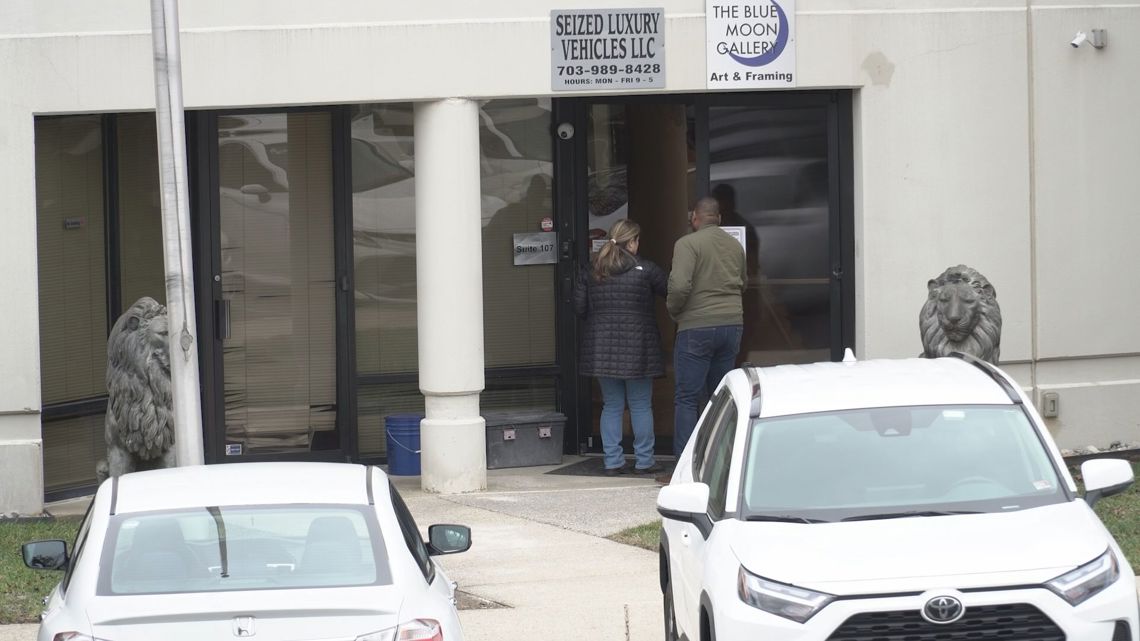
The WUSA9 team also saw what appeared to be art wrapped up behind some fencing and another room where dozens of roadside signs were being printed for an upcoming auction in March. So when the March auction date arrived, WUSA9 went.
Once at the Auction in Woodbridge, Virginia, the team noticed the same large white truck that was at the Maryland auction they attended back in November 2023 and which had been spotted several times at other auctions in Maryland. One of the main attractions at the Woodbridge auction was a brightly colored, orange Lamborghini.
Once again, inside the auction WUSA9 attendees were told they could not record video or take photos, but they were able to record audio during the auction.
“This is an original Peter Max acrylic,” said the auctioneer, showing off a brightly colored photo of Lady Liberty.
Upon a closer look, the Peter Max painting looked familiar, identical even, to the painting the WUSA9 team members had seen saw inside Blue Moon Gallery a few months before.

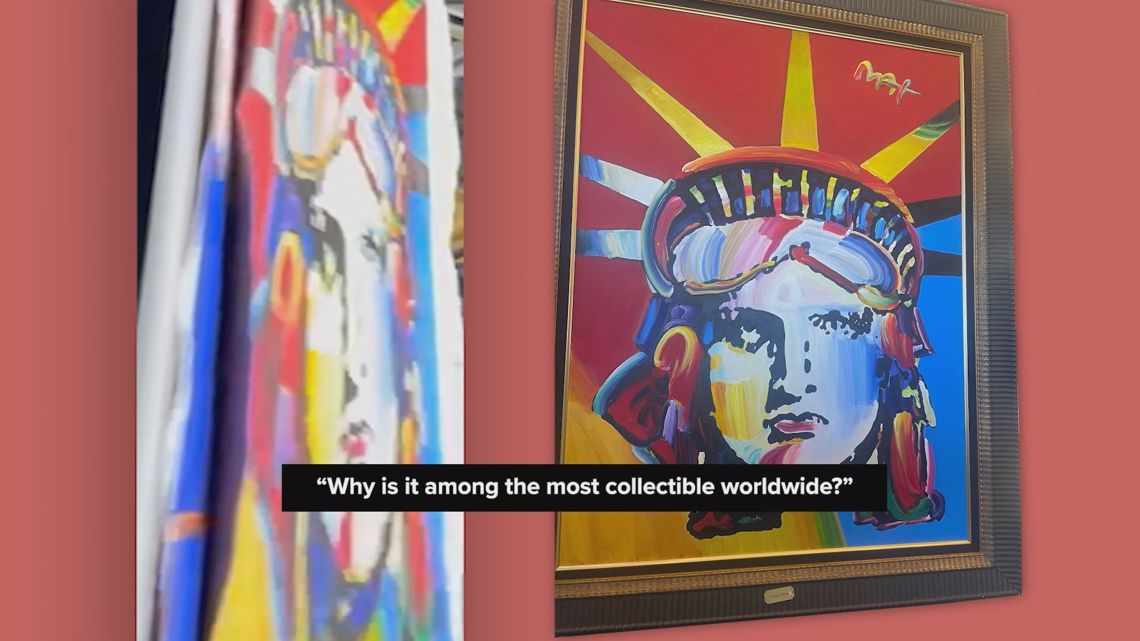
“Now, you may say to yourself, how do I value this particular piece?” the auctioneer said before the packed room. “You’ll see these in approximately 60 inches by 24 for $40,000.”
One couple, Kirsti and her husband Christopher, who asked that only their first names be used, purchased the Lady Liberty head painting for $20,000, but not without some reservations.
“I had no idea what to expect,” said Kirsti.
WUSA9 was not able to independently confirm the authenticity of the Peter Max Liberty Head paintings, including whether the painting WUSA9 saw at the warehouse was the same painting sold at the auction, and whether they were originals, reproductions or prints. Multiple calls to Peter Max’s studio and the auctioneer went unanswered.
There were also questions about the certificate of authenticity attached to the back of the Liberty Head painting. Two art appraisers, neither of whom were connected with the auction dispute, said important information was missing from the Peter Max certificate of authenticity on Kirsti and Christopher's purchase, including the name of the certifying official. While a signature was present, it was illegible and no other identifying information of the certifying officer was available.

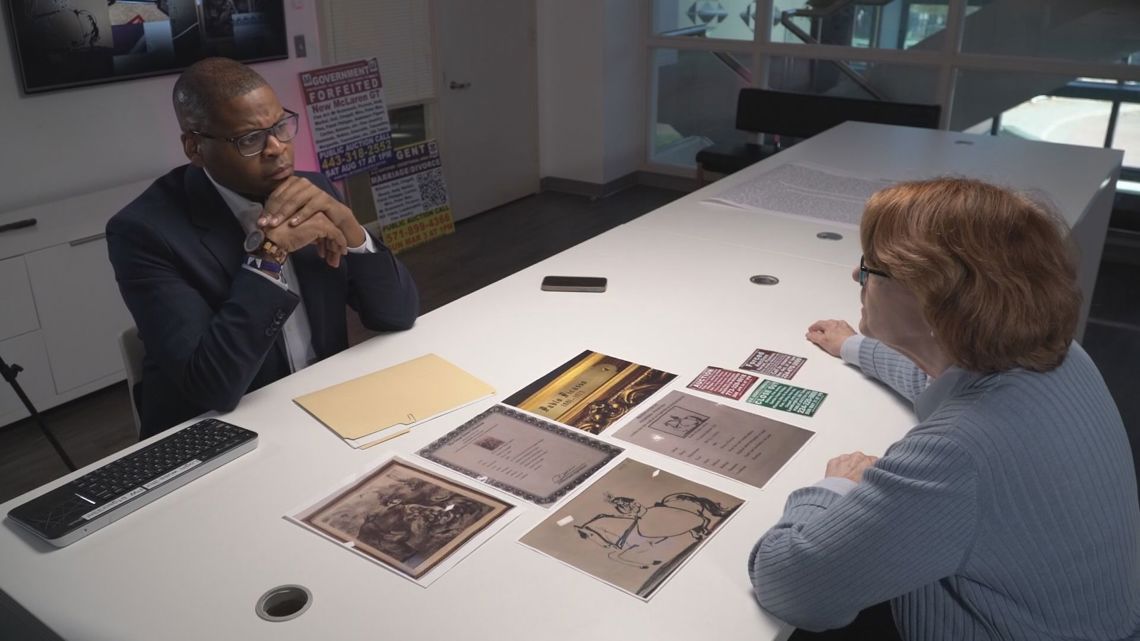
“Anybody can generate a certificate of authenticity," said Sandra Trooper, an art appraiser with more than 25 years of experience. "You can find something that has a pretty gold seal and a little bit of design around the outside and you can put in whatever information you want. You want to know who signed it.”
Concerned about their purchase, Kirsti and Christopher demanded the transaction be terminated.
“Rather than make this complicated, I’m going to ask you to cancel the transaction,” Christopher asked a man who worked for the auction company, who only identified himself as Alex.

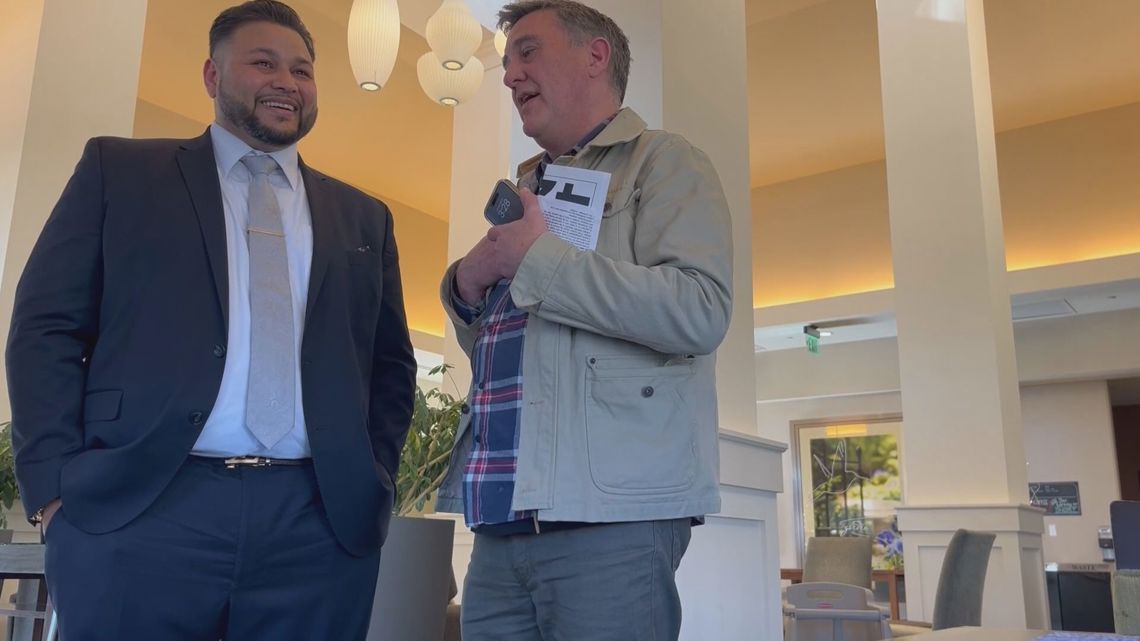
After some back and forth, both Alex and Christopher ventured off to another section of the hotel lobby to speak privately. Christopher eventually returned with news. He had gotten his money back.
Once the auction ended, WUSA9 attempted to speak with Alex who said the items used in the auction came from consignment though he declined to provide specifics.
“I’m not the owner. You ask me questions like I’m the owner,” Alex said. “Everything is legit. Only somebody paid extra and then now they’re getting cold feet. That’s not…because the art is fake. It happens all the time.”
Experts warn consumers to do their due diligence before buying any sort of expensive art. Be sure to consult with an art appraiser before attending an auction, buy from known dealers, and consider consulting with an art advisor through the Association of Professional Art advisors.
"You want an art advisor if you're serious about putting a collection together," Trooper said.


